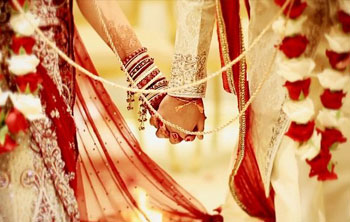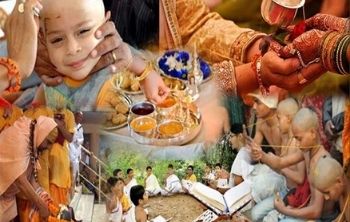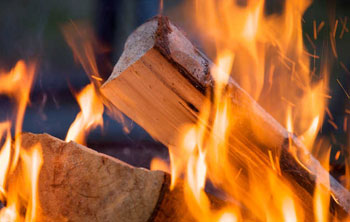Overview
This section is to help you to find all the resources linked with Topic Panditji for the Marriage. For Vedic Wedding, Hindu Wedding, Vedic Arya Samaj Vivah, Hindu Pandit for Wedding, Book online or call at our helpline for enquiries in Borivali.
Contact Options
Call Helpline: +91 88794 71117
Book your Pandit online: aryasamaj56@gmail.com
Resources available:
1. Types of Marriages / Wedding
2. When to Perform Vivah Puja (Marriage Rituals)
3. Panditji for Wedding Events Puja in Borivali
4. Panditji for Vedic Wedding in Borivali
5. Hindu Marriage or Wedding Rituals
6. Marriage (Vivah) Puja Samagri List
7. Book Online Panditji for Marriages in Borivali
Types of Marriages or Wedding
When we study the Hindu Sacred texts like Asvalayana Garhyasutra and Atharvaveda, we find that according to Hinduism there are eight different types of marriages.
Among the eight types, not all had religious sanction. The first four of them were categorized as Prashasta or proper marriages conducted by following appropriate religious customs. The remaining four were considered as Aprashasta, which referred to inappropriate unions between man and woman that did not follow any Vedic or religious ritual.
Prashasta Vivah or Proper Marriages:-
The below four types of marriages were considered as Prashata marriages (Proper Religiously appropriate under Hinduism), since they contain vows from Vedic Scriptures, where both the bride and groom commit to each other and share responsibilities to their families.
- Brahma Vivah – Brahma Vivah is considered the most appropriate form of marriage in Hindu Society. In this, the boy and girl belonging to good families and the same caste get married. The boy should have completed his Brahmacharya Ashram(studenthood). There is no dowry involved and the girl enters the boy’s house with two sets of clothes and some ornaments. In this marriage, the boy’s family approaches the girl’s family. “Kanyadaan”, which is the handing of the bride by her father to the groom, is an important ritual of the Brahma Vivah. It is the marriage that takes place upon receiving mutual consent from both the bride and grooms families.
- Prajapatya Vivah— The Prajapatya Vivaah is the type in which the parents look for a spouse for the girl. The major difference is that the ritual of Kanyadaan is not observed. The father instead gives the girl’s right hand in the left hand of the boy. This way he accepts her as the left half of his body and takes the responsibility to look after her. This ritual is known as Panigrahan ritual.
- Daiva Vivah—Daiva Vivah refers to the one in which the girl is married to a priest. When the parents search but are not able to find a suitable groom for the girl, they can decide to marry her to a person who officiate the religious ceremonies. This kind of marriage is also considered good, as marrying the girl to a priest (which obviously can be of her age), would bring her the virtue which the priest gets by performing religious rituals.
- Arsha Vivah – In this type of marriage, the family of the groom pays Kanya-shulkamor bride-price to the parents of the bride. According to certain texts, the prescribed bride-price is a cow with a calf and a pair of bulls. The groom takes an oath to effectuate his commitment towards the bride and her family.
Several instances are found in the Puranas of marriage between a man from mainstream communities and a woman from one of the bride-price seeking communities. In nearly all cases, the man willingly pays the bride-price and brings his bride home.
Aprashasta Vivah or Improper Marriages:-
Following are the Four types of Aparshasta Vivah forms —
- Gandharva Vivah— The bride and the groom either start living together as a couple out of love and mutual consent or get married without a formal ceremony as well as without the consent of their families.
Since this type of marriage is entered into without religious ceremonies, it is categorised as inappropriate. - Asura Vivah — In this type of marriage, the bride’s father has been intimidated or bribed by the groom or his family into giving his consent to giving up his daughter for marriage.
This marriage is similar to Arsha Vivah, the difference being the dowry or presents are given in order to get the girl through greed and not to help the father finance the marriage function.
However, Arsha marriage is considered appropriate but this is not, as the greed for money and not the suitability of the groom for the girl might become the selection factor.
- Rakshasa Vivah— Rakshasa Vivah is the one in which the groom forcibly abducts the girl against her as well as her parents’ wishes. This is considered inappropriate and is forbidden religiously. Thus it can also be called a misdeed since it is against religious norms.
This violent, forcible form of marriage thankfully no longer exists.
- Paisacha Vivah— In the case where the bride is intoxicated, possessed or not in a conscious state of mind when being married and thus is married unwillingly.
This is the most brutal of all types of marriages, where the groom forces himself upon the bride first and then accepts her as his bride. This type of marriage is also forbidden religiously.
The last two types of marriages were not only indecorous but also religiously impermissible.
When to Perform Vivah Puja (Marriage Rituals)
The marriage Ceremony is performed on an auspicious Muhurta that is selected after going through the Couple’s horoscope. The Vivah or Wedding ceremony is always chosen on the day that shall be most beneficial to both the bride and groom.
You can book Panditji for your Marriage Ceremony or Vivah Puja or Wedding Ceremony.
All the Puja Samagri will be brought by Arya Samaj Panditji. All the Panditji are well experienced and studied from Vedic Pathshala.
Panditji for Wedding Events Puja in Borivali
Panditji is available for all the events of a Marriage. May it be Mandap Pujan, Haldi Vidhi, Tilak Ceremony, Ring (Engagement) Ceremony, Shagun Ceremony, Matripujan, Janeu Vidhi, Grah Shanti Pujan, Chuda Ceremony, Mimi Vidhi, Sehrabandi, Vivah Pujan etc all Marriage Rituals.
Book your Panditji now if you are planning for Hindu Weddings in Borivali shortly.
Marriage or Vivah or Wedding Ceremony is one of the most important events in one’s life. This event signifies the transitional state from Brahmacharayashram to Grihasthashramam. This is the time when the family members and the society realizes and accepts that their children are finally mature enough to start a new family.
Vivah or Hindu marriage is viewed as sacramental, which is a lifelong commitment of one wife and one husband. It is the strongest bond between a man and a woman, which takes place in the presence of their Parents, Relatives and friends. This is an irrevocable commitment for a lifetime.
Performing Pooja for Marriage Ceremony acts as an invitation to the Many Gods and Goddesses by performing various rituals to come and bless the couple. The Fire acts as the witness or Sakshi to this Holy Union. The promises made during Vivah Puja are lifelong commitments that the bride and the groom make to each other.
Hence by performing this puja or ceremony, it ensures the blessings of all our ancestors, Hindu God and Goddesses also bestows blessings for harmony, prosperity and healthy married life for the couple.
Panditji for Vedic Wedding in Borivali
As per Hindu norms, you have the option to perform one of the two types of weddings.
Pauranik Marriage: The Hindu wedding which is performed on the basis of Purans is Pauranik Marriage. This is the traditional Hindu Wedding ceremony with lots of rituals spread over a few dates.
Vedic / Arya Samaj Marriage: The Hindu Wedding which is performed on the basis of Vedas is Vedic Marriage or Arya Samaj Wedding. This is the traditional Hindu Wedding ceremony that follows the Vedic Rules and is also one of the spiritually accepted forms of weddings to seek God’s blessing. Arya Samaj / Vedic Marriages are a simpler and cost-effective alternative.
Arya Samaj Marriage Rituals performed by Panditji
Contact Arya Samaj for conducting Arya Samaj Marriage in Borivali. You need to bring 2 Varmalas (Garlands). Besides that, you need to bring fresh flowers, 2.5 meters of Pink or White cloth, 500 gms Sweets, Sindoor and Mangalasutra, on the day of marriage.
Arya Samaj does not believe in Idol Worship. The entire process of marriage is based on Vedas. The process of marriage takes 2 hours. Following is the list of marriage rituals. Please click on each to find the details.
- Swagat & Introduction (Welcome)
- Kanya Agaman (Arrival of the Bride)
- Jai Mala (Exchange of Garlands)
- Madhupak (Offerings)
- Kanya Daan (Giving hand of the bride)
- Thread Ceremony and Yagna
- Paani Grahan (Accepting the Hand)
- Shila Rohan
- Mangal Phera
- Saptapadi
- Sindhoor Daan
- Akhand Subhagyavati
- Aashirvaad and Shanti Path
Contact Arya Samaj for you all Puja requirements.
Contact Options
Call Helpline: +91 88794 71117
Book your Pandit online: aryasamaj56@gmail.com
Hindu Marriage or Wedding Rituals in Borivali:
Arya Samaj Marriage Rituals performed by Panditji –
Introduction:
Among the 16 Sanskaras, Vivah Sanskar or Marriage has the greatest significance. Arya Samaj Wedding rites originate from the Vedas. They are devoid of idol worship.
The rituals not only bind the bridegroom and the bride in marital bond of love and respect for each other but also lay down a code of conduct towards the family and society of which they are an integral part. Every phase of the ceremony is infused with symbolic meaning and spiritual significance.
Contact us for your marriage booking requirements.
Contact Options
Call Helpline: +91 88794 71117
Book your Pandit online: aryasamaj56@gmail.com
Vedic Marriage Ceremony:
Time Required: 2 Hours
Rituals:
- Swagat & Introduction (Welcome)
A welcome ceremony is hosted to extend greetings to the bridegroom, bride, family and friends. - Kanya Agaman (Arrival of the Bride)
The Bridesmaids and the father escort the bride to the Mandap.
- Jai Mala (Exchange of Garlands)
Panditji guides the couple to the Mandap. Bride welcomes Groom with a floral garland and Groom garlands Bride. This exchange symbolizes formal acceptance and respect.
- Madhupak (Offerings)
The bride offers a mixture of Honey and Yogurt to the groom. Honey symbolizes the sweetness of eternal love and yogurt for the sake of his eternal good health and nutrition.
- Kanya Daan (Giving hand of the bride)
It is believed that the daughter (Kanya) is the prime wealth of a Hindu house, who symbolizes the Hindu Goddess of Wealth (Lakshmi). Bride’s parents will place her hands into the Groom’s hand and pour holy water over them to finalize the gesture of gift-giving (transfer of wealth). Bride’s father requests Groom to accept his daughter as an equal partner in all walks of life. It is noted in Vedic scriptures that there is no “Daana” (gift) greater than Kanya Daan (giving a daughter’s hand in marriage). Groom promises to accept Bride as his equal life partner
- Thread Ceremony and Yagna
During this ceremony, the groom wears a sacred thread. This is the initiation ceremony and symbolizes the transition from a boy to a married man. The couple worships fire during the yagna and give alms. Fire is the witness to the sacred ceremony and hence the vows are always taken in front of the fire.
- Paani Grahan (Accepting the Hand)
The bridegroom holds the hand of the bride and both of them solemnly pledge before God that they have become one and will forever love each other and remain mutually devoted for the rest of their lives.
- Shila Rohan
A rock is placed in the northeast corner of the Mandap. While Bride places her right foot on the piece of rock. Groom recites a hymn the Ashma Bhava, The statement is to encourage his wife to be as strong as the rock, to be firm towards any difficulties of life they may face together. Rice and flowers are sprinkled on the couple by her parents, relatives, and friends.
- Mangal Phera
Bride’s brother puts rice in the hands of Bride & Groom to offer to Agni (the Lord of Fire) who dispels darkness and ignorance while leading into light and knowledge. The couple then walks around the sacred fire. Each round represents the four basic goals of human life:Dharma: Moral sense to lead a good lifeArtha: Financial prosperity theKama: Blessing for strong, virtuous children and to share the responsibilities of homeMoksha: Self-restraint and eternal physical, mental and spiritual strengthTogether the four goals symbolize the couple’s commitment to each other and the community.During the first three rounds, Bride leads Groom and during the last round, Groom leads.
- Saptapadi (Seven Steps)
The bride and groom take seven steps forward together, symbolizing the beginning of their journey through life.
These steps signify the guiding principles of life. Each of these steps represents the vows made by the couple:
First Step: To Nourish each other, both of us will work together to bring Grains to our home
Second Step: To Strengthen Our Marital Life, will get energy from that Grain
Third Step: We will earn Money honestly, which is needed for our household requirements in life
Fourth Step: The Grihastha Ashrams is considered as the best Ashram, so the fourth step is together will continue to increase happiness in life.
Fifth Step: With the thought of sacred mind, wishing the best offspring to be debt free from Pitra-rina.
Sixth Step: Efforts to stay away from diseases with seasonal dietary exercise
Seventh Step: Husband and wife should be friendly with each otherThese 7 steps are a pledge to make marital life strong.
These 7 steps are the foundation of the householder’s house.With these seven steps forward the couple is now united and will pray for blessings from God. The father-in-law offers the bride a sacred necklace.
- Sindhoor Daan
The bridegroom applies Sindhoor (Red Powder) in the parting of the bride’s hair and welcomes her into his life as his eternal partner. The newly wedded couple touches the feet and takes blessings from the parents of both families.
- Akhand Subhagyavati
Married women from the bride’s family come forth to wish her eternal happiness by blessing her Akhand Subhagyavati bhava.
- Aashirvaad and Shanti Path
Panditji recites a hymn and all guests and relatives join him to wish the newlywed couple good luck, prosperity and a long, happy married life together. With the quote “Arya Samaj Vivah Vidhi Sampann Hui” by Panditji the wedding rituals gets completed.
FAQs – Arya Samaj Marriage Rituals
What is the duration for the Arya Samaj marriage process?
Arya Samaj marriage process takes 2 hours in total.
How many Mangal Pheras are there in the process of Arya Samaj Marriage Rituals?
In Arya Samaj Marriage Rituals there are 4 Pheras, along with this there are 3 more parikrama of
Agni.
How many Panditjis are mandatory in the Arya Samaj marriage process?
For the process of marriage of Arya Samaj mandatory requirement is of 1 Panditji. But if you wish, you can increase the number of Panditji with prior intimation on booking and paying extra.
Who arranges for requirements of Puja for marriage ceremony?
If you are getting married in the Arya Samaj temple then the puja material is arranged by the temple itself, but if you call Panditji for the marriage process at your venue, then the arrangements for the puja material are done by Panditji.
In both the cases, some material, as per list provided to you while booking is to be arranged by you,
What is the cost for Arya Samaj Marriage Process?
If you get married in the Arya Samaj Mandir, then all the details about the expenses involved will be shared by Office.
For More FAQ’s Click Arya Samaj Marriage Section
In case you need Panditji to visit the venue of marriage, then Panditji will share the details of the expenses involved.
Marriage (Vivah) Puja Samagri List
After the bookings are confirmed with Arya Samaj Mandir, it is very important to list the requirements of Vivah.
The Puja Samagri list pays a vital role for completion of uninterrupted wedding ceremony. During arrangements the Puja material should be collected and put together. This is important as nowadays the wedding venue is not Home or Mandir, the boy and the girl both marry in hotels or resorts, hence the systematic arrangement is a must.
After the date is confirmed with Arya Samaj for wedding, make sure that you find out rituals of your family, as every Hindu Family has different rituals. Either take the list of Samagri from elders in the family or you can also take a list of worship material from Panditji.
Vedic Wedding Marriage is a simpler and cost-effective alternative. The following is the list of Puja material to be bought along with you on the day of marriage:-
- Two Varmala and Some Loose Flower
- 5-meter Pink fabric for Gathbandhan
- 1 kg of Sweets
- Sindoor and Mangalasutras
- 500 grams pure cow ghee the day of marriage.
Book Online Panditji for Marriages in Borivali
Call Helpline: +91 88794 71117
Book your Pandit online: aryasamaj56@gmail.com
Visited 567 times, 1 Visit today



